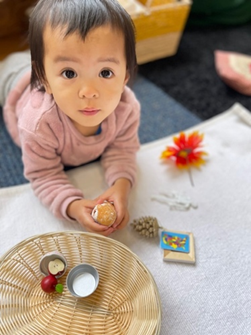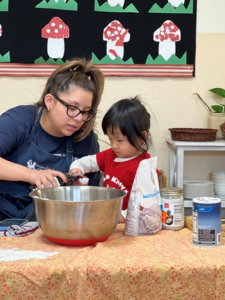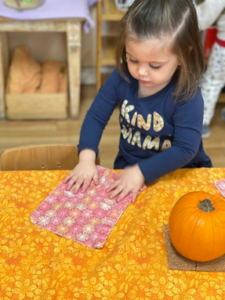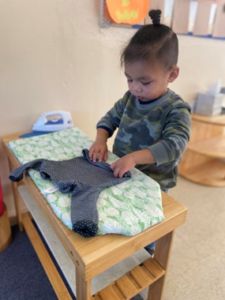
By Colleen Noll
Pre Primary’s “Let me do it”
Using the Montessori method at home while attending a fully implemented Montessori program is a good way to help eliminate tantrums and ultimately guide your child toward independence. With a few steps and consistent approach, you can help your child to feel more in control and have the capability to make decisions for themselves. While parents can always start implementing the Montessori method as early as infancy, Pre Primary is also a great time to start looking at schedules, tasks and your approach. At MSOSV, the guides follow these simple tips which you can also adopt at home.
1. Don’t jump to conclusions and allow extra time to understand
When your child becomes upset, sometimes it is difficult to know what has upset them. In the Montessori classroom, the guide takes extra care to first try and understand what has upset the child. This requires patience and understanding on the part of the adult. Something that might not seem like a big deal to you or to the guide, may in fact, be a big deal to the child. It is important to first take the time to show empathy and understanding and then see if you can help. It might be as simple as the child wanting to hang up their own jacket. Seek to understand first. This will begin to help shorten and – over time – eliminate tantrums.
2. Be Prepared
While the routine may seem simplistic, the MSOSV guide prepares a detailed and well thought out plan. The guide thinks about including the child in the end-to-end process, including the children in all activities in the community. Adopting this approach as a parent may seem overwhelming at first, but once you get the hang of things and get into a rhythm, you will notice changes in your child that keep you inspired to consistently prepare and involve your child.
3. Guide Them
Instead of being the child’s boss and saying things like “let me do it”, or “I’ll do it for you”, focus on coaching them how to do it. When you provide the next step verbally, you allow them to learn without you taking over. This encourages them and allows them to feel accomplished about completing a task. Sometimes a simple guide with your hand – such as an open palm – gesturing the direction to the child while following with your eyes. They will follow with their eyes as well. In the  Montessori community, you will notice the Lead gently helping by guiding the child. Ultimately, by remaining at their side, and assisting with “hand-over-hand” movements, the child gains the confidence to try the task themselves.
Montessori community, you will notice the Lead gently helping by guiding the child. Ultimately, by remaining at their side, and assisting with “hand-over-hand” movements, the child gains the confidence to try the task themselves.
4. Involve you Pre Primary child in daily plans and routines
Children like to feel helpful. It is important to let them help with daily tasks, not only do they learn how to complete tasks themselves, children also begin to believe they are capable of doing it which in turn builds their confidence. When children are involved in routines, they feel more in control of their day, which helps them to be more in control of their emotions.  At MSOSV, the guides in the Pre Primary community begin involving the children (as young as 18 months), in the daily classroom plans and routines.
At MSOSV, the guides in the Pre Primary community begin involving the children (as young as 18 months), in the daily classroom plans and routines.
5. Keep it Simple – Establishing Routines
When you stick to a regular routine, the Pre Primary child’s internal clock is busy at work, and they come to anticipate certain parts of their day. For example, an observer in the Pre Primary Community at MSOSV will notice that just before the “clean-up” chime rings, some children are already putting their work away, and moving into the transition time for what is next. This is fascinating to watch in the Montessori classroom. Even though these young children cannot tell time, they count on the established routine. Their internal clock allows them to anticipate the upcoming change. For children who find transitions to be difficult, establishing a working routine helps to eliminate and minimize tantrums.
6. Prepare for change – take it slow
When you have a big change in routine approaching, it’s best to tell your Pre Primary child a few days ahead of time and continue to remind them of the coming change. This allows them to prepare and adjust with some sense of control over their emotional state.
If you think about it, even adults typically respond better to change when we are made aware of it before it happens, it is fair to treat the children with the same respect. During the Montessori school day, the guides use circle time/group time to talk about upcoming changes to the daily routine. This allows time for questions and discussion about the upcoming change. Once the change is happening, the guides provide gentle reminders to help the children adjust.
The Montessori philosophy in the MSOSV classrooms always lead to “independence”. Involving the children in all aspects of the classroom community helps to build confidence, concentration, order and ultimately independence. When children are independent and happy – in other words, “in control” – the tantrums will decrease in severity and eventually cease all together.
Below we share some ideas of activities that are part of the daily routine at MSOSV that you can also incorporate at home. Be careful to introduce one at a time and give each activity time to become part of your routine.
Chore-related Activities and Activities that Teach Life Skills
 Use these activities to build one on top of another. As your child grows, they will want to complete more difficult tasks, tasks that require more steps.
Use these activities to build one on top of another. As your child grows, they will want to complete more difficult tasks, tasks that require more steps.
This is a good starter list of ideas for you to help your child become independent and self-confident. This all leads to less tantrums and frustration for both you and your child.
Consistency is key, stick with it, even when it feels too hard. Also, work on one area/chore at a time. Remember to be patient with yourself. Sometimes laughing with your toddler and laughing at yourself helps to diffuse difficult moments. Have some fun with it.